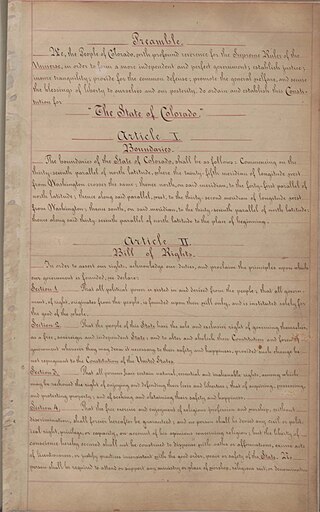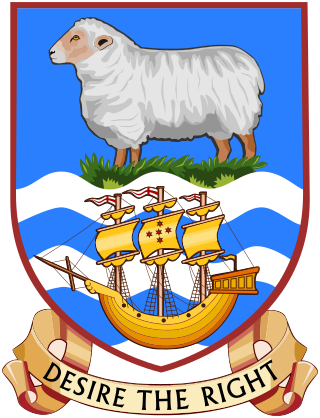A constitutional amendment is a modification of the constitution of a polity, organization or other type of entity. Amendments are often interwoven into the relevant sections of an existing constitution, directly altering the text. Conversely, they can be appended to the constitution as supplemental additions, thus changing the frame of government without altering the existing text of the document.
A supermajority is a requirement for a proposal to gain a specified level of support which is greater than the threshold of one-half used for a simple majority. Supermajority rules in a democracy can help to prevent a majority from eroding fundamental rights of a minority, but can also hamper efforts to respond to problems and encourage corrupt compromises at times when action is taken. Changes to constitutions, especially those with entrenched clauses, commonly require supermajority support in a legislature. Parliamentary procedure requires that any action of a deliberative assembly that may alter the rights of a minority have a supermajority requirement, such as a two-thirds vote. In consensus democracy the supermajority rule is applied in most cases.
A double majority is a voting system which requires a majority of votes according to two separate criteria. The mechanism is usually used to require strong support for any measure considered to be of great importance. Typically in legislative bodies, a double majority requirement exists in the form of a quorum being necessary for legislation to be passed.
In Australia, referendums are public votes held on important issues where the electorate may approve or reject a certain proposal. In contemporary usage, polls conducted on non-constitutional issues are known as plebiscites, with the term referendum being reserved solely for votes on constitutional changes, which is legally required to make a change to the Constitution of Australia.
The Constitution Alteration Bill 1974, was an unsuccessful proposal to alter the Australian Constitution to make it easier to amend the constitution and give voters in the Australian territories the right to vote in referendums. It was put to voters for approval in a referendum held on 18 May 1974.

The electorate of Iraq went to the polls on 15 October 2005 to vote in a referendum on whether or not to ratify the proposed constitution of Iraq. After 10 days of counting votes, the country's electoral commission announced that the constitution had been approved by a wide margin nationwide. A number of mainly Sunni critics like future deputy prime minister Saleh al-Mutlaq alleged massive irregularities, saying that soldiers broke in to polling stations and changed votes to yes in the crucial province of Nineveh, which was expected by them to provide the third "no" vote.

The Consultative Assembly is the legislative body of the State of Qatar, with 45 members. Following the 2021 Qatari general election, it has 30 elected and 15 appointed members. The body can only question the prime minister, who is appointed by the Emir of Qatar, on his policies if two-thirds of the members agree, which is unlikely given that one-third of the members are appointed by the Emir.

The Constitution of the State of Colorado is the foundation of the laws and government of the U.S. state of Colorado. The Colorado State Constitution was drafted on March 14, 1876; approved by Colorado voters on July 1, 1876; and took effect upon the statehood of Colorado on August 1, 1876. As of 2020, the constitution has been amended at least 166 times. The Constitution of Colorado derives its authority from the sovereignty of the people. As such, the people of Colorado reserved specific powers in governing Colorado directly; in addition to providing for voting for Governor, state legislators, and judges, the people of Colorado have reserved initiative of laws and referendum of laws enacted by the legislature to themselves, provided for recall of office holders, and limit tax increases beyond set amounts without explicit voter approval, and must explicitly approve any change to the constitution, often with a 55% majority. The Colorado state constitution is one of the longest in the United States.
Two referendums were held in Switzerland in January and May 1879. A federal law on subsidies for railways in the Alps was passed by 70.7% of voters on 19 January, whilst a referendum on abolishing the constitutional ban on the death penalty on 18 May was passed by 52.5% of voters and a majority of cantons. Following the vote, ten of the 26 cantons reintroduced the death penalty during the 1880s and 1890s and nine executions occurred before its nationwide abolition in 1938, when a new criminal code was approved in a referendum.
Three referendums were held in Switzerland in 1882. Two were held on 30 July on copyright law and measures against epidemics, both of which were rejected. The third was held on 26 November on executing article 27 of the federal constitution, and was rejected by 64.9% of voters.
Three referendums were held in Switzerland during 1898. The first was held on 20 February on a federal law that would nationalise the railways, and was approved by a majority of voters, leading to the establishment of Swiss Federal Railways in 1902. The second and third referendums were held on 13 November on revising article 64 and adding article 64bis to the constitution, both of which were approved by a majority of voters and cantons.
Three referendums were held in Switzerland during 1897. The first was held on 28 February on a federal law establishing a Central Bank, and was rejected by a majority of voters. The second and third were held on 11 July concerning an amendment to article 24 of the constitution and on legislation on potentially harmful foodstuffs and stimulants. Both were approved by a majority of voters and cantons.
Four referendums were held in Switzerland during 1935. The first was held on 24 February on a federal law reorganising the military, and was approved by voters. The second was held on 5 May on a federal law on the transport of goods and animals on roads, and was rejected by two-thirds of voters. The third was held on 2 June on a popular initiative "to combat the economic crisis" and was also rejected by voters. The fourth was held on 8 September on a popular initiative "for a total revision of the federal constitution", and was rejected by 72% of voters.
Six referendums were held in Switzerland during 1938. The first four were held on 20 February; the first on amending articles 107 and 116 of the constitution to make Romansch an official language, which was approved by over 90% of voters and all cantons. The second was on a popular initiative "on urgent federal resolutions and the protection of people's rights" and was rejected by 85% of voters. The third was on a popular initiative on the private arms industry, and was also rejected by a wide margin, whilst the fourth was on a counter-proposal to the arms industry question, and was approved by voters. The fifth referendum was held on 3 July on the penal code, and was approved. The sixth and final referendum of the year was held on 27 November on a federal resolution on the transient order of the federal budget, and was approved by 72% of voters.
Four referendums were held in Switzerland during 1939. The first two were held on 22 January on a popular initiative on civil rights and a federal resolution on the restricted use of the urgency clause in the constitution. The third was held on 4 June on a constitutional amendment regarding the funding for government policies on defence and unemployment, and was approved by voters. The fourth was held on 3 December on a federal law on the employment status and insurance for federal civil servants, and was rejected by voters.
Three referendums were held in Switzerland during 1947. The first was held on 18 May on a popular initiative for "economic reform and rights concerning work", and was rejected by voters. The second and third were both held on 6 July on revising the articles of the federal constitution covering the economy and a federal law on aged and bereavement insurance. Both were approved by voters.
Four referendums were held in Switzerland during 1949. The first two were held on 22 May on revising article 39 of the federal constitution concerning the Swiss National Bank and a federal law amending a 1928 law on measures against tuberculosis, with both rejected by voters. The third was held on 11 September on a popular initiative "for the recurrence to direct democracy" and was narrowly approved. The final one was held on 11 December on a federal law to amend the employment status of federal civil servants, and was also approved.
A referendum is a direct vote in which an entire electorate is asked to either accept or reject a particular proposal. This article summarises referendum laws and practice in various countries.
A statutory referendum on the approval of the Basque Statute of Autonomy was held in the Basque Country on Sunday, 5 November 1933. Voters were asked whether they ratified a proposed draft Statute of Autonomy of the Basque Country. Article 12 of the Spanish Constitution of 1931 allowed for Spanish provinces to be organized into "autonomous regions", provided that a regional Statute was proposed by a majority of the provinces' municipalities comprising at least two-thirds of the provincial population and that two-thirds majority of all those eligible to vote accepted the draft Statute.

A referendum on reforming the electoral system was held in the Falkland Islands on 24 September 2020, after being postponed from 26 March 2020 following the Coronavirus pandemic. Voters were asked if they wanted to replace the two existing electoral constituencies with a single constituency for the whole of the Islands. Although a majority of those who voted supported the change, the required two-thirds majority in both of the islands' constituencies was not achieved.



